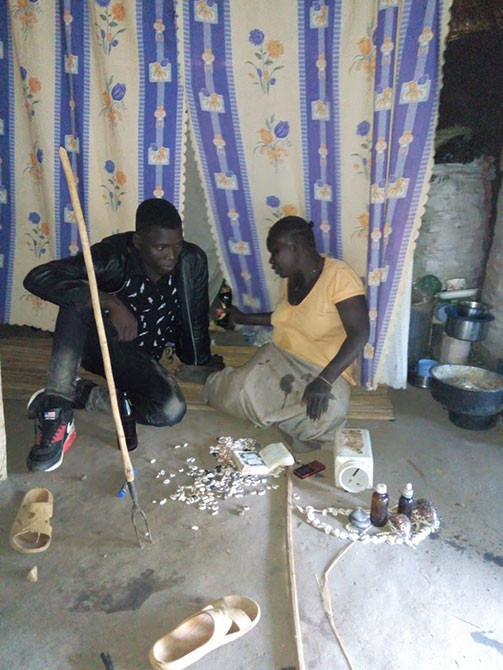It’s undeniable that the term “Witchcraft Doctor” often conjures negative images. In many parts of the world, including Acholi, Uganda, there’s a prevalent association of these figures with malevolence. As I set out to interview local practitioners as part of research into Public Authority in marginalized areas, this perception was immediately apparent. Even a simple motorbike taxi ride to a witchcraft doctor’s home was met with a barrage of questions from the driver, betraying deep-seated prejudices. Are they solely figures of fear, or do they play more nuanced roles within their communities?
Many might struggle to imagine a witchcraft doctor involved in community support, perhaps even mediating land disputes for widows or offering counsel in family matters. Yet, my conversations with witchcraft doctors in Northern Uganda revealed a far more complex reality. Akumu Christen, a female witchcraft doctor, shared her journey into this role, highlighting the unexpected nature of her calling:
 Akumu Christen, a witchcraft doctor in Northern Uganda, showcases the tools of her practice, including a spear representing a god and symbolic items for peace and protection.
Akumu Christen, a witchcraft doctor in Northern Uganda, showcases the tools of her practice, including a spear representing a god and symbolic items for peace and protection.
Akumu explained, “It was in 2009 when I became a witchcraft doctor, even though I never wanted to be one. In 2005 I was attacked by a ‘jok’ for the first time.” She detailed how a ‘jok’, a spirit in Acholi belief linked to illness, initiated her path. In Acholi tradition, illness caused by a jok necessitates intervention by traditional healers, known as ajwaka. These healers identify the specific jok and perform rituals to appease it. Alternatively, an individual possessed can undergo rituals to control the jok and become an ajwaka themselves.
Akumu’s experience was marked by resistance and hardship. Initially, she resisted the calling, leading to a period of mental distress. “This jok wanted me to become a witchcraft doctor. When I resisted, I became mad for three months,” she recounted. Even after a conversion to Christianity offered temporary relief, the spirit’s persistent demands led to a more severe breakdown. Ultimately, initiation into becoming a witchcraft doctor was seen as the only resolution.
Despite initial fear of social stigma, Akumu discovered a purpose beyond the negative stereotypes. Her guiding spirit, jokajula, she learned, “does not support wrong-doing like killing people. I don’t do rituals to kill people but to help them.” This revelation redefined her understanding of her role, focusing on community assistance rather than harmful practices often associated with the term “witchcraft doctor.”
Akumu now serves her community in Paico in a variety of crucial roles, acting as a vital community resource:
Mental Health Support: Akumu works with victims of the Lord’s Resistance Army (LRA) conflict, addressing spiritual distress and trauma. She helps prevent spirit attacks, manages nightmares, and aids in community reintegration for those who endured horrific experiences. In this capacity, she functions much like a modern mental health worker, addressing psychological wounds through a traditional framework.
Peace and Reconciliation Facilitator: In cases of inter-clan conflict, Akumu plays a role in reconciliation. Notably, she is involved in summoning the spirit of deceased victims to determine fair compensation (‘kwo money’), acting as a spiritual mediator in restorative justice processes. This highlights the witchcraft doctor’s role in conflict resolution and maintaining social harmony.
Family and Relationship Counselor: Addressing deeply personal issues, Akumu offers solutions for barrenness in men and women, a critical concern in Acholi culture where children are central to family and societal structure. She also intervenes in broken marriages and relationships, providing spiritual and practical guidance to restore familial bonds. This function aligns with that of a family therapist, addressing interpersonal issues within a cultural context.
Economic Empowerment Advocate: Akumu assists individuals believed to be suffering from ‘bad luck’ imposed by others seeking to keep them impoverished. By ‘removing bad luck’, she aims to improve livelihoods, directly addressing economic hardship and perceived spiritual barriers to prosperity. This role positions her as an advocate for economic well-being within her community.
Community Disaster Mitigation: Elders consult Akumu to perform rituals aimed at preventing natural disasters like droughts or floods. This demonstrates the witchcraft doctor’s role in community-level preventative measures, appealing to spiritual forces for protection against environmental threats.
Beyond her roles as a witchcraft doctor, Akumu is also a mother and wife, living a multifaceted life that challenges the one-dimensional stereotype of a sinister figure. Her story and the roles she undertakes prompt a crucial reconsideration: Is the image of a witchcraft doctor as inherently “bad” accurate? The reality, as Akumu’s experiences reveal, is far more complex and deeply interwoven with the social and spiritual fabric of Acholi community life. Perhaps it’s time to look beyond simplistic labels and understand the diverse and often vital contributions of these practitioners within their own cultural context.

